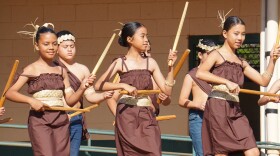To understand how to navigate the current choppy political waters, one can look to the past.
In a nod to Hawaiian History Month, a forum sponsored by the Honolulu mayor's office and the city council is to take place on Tuesday to highlight the changing political climate and the concern that programs to help Native Hawaiians are being targeted.
Honolulu Councilmember Esther Kiaʻāina will take part in the event at the Mission Memorial Auditorium. She represents the Windward Oʻahu communities from ʻĀhuimanu to Waimānalo, including Kāneʻohe and Kailua.
Kiaʻāina previously worked in Washington, D.C., for the Interior Department and for former U.S. Sen. Daniel Akaka. She has a deep understanding of the inner workings of our nation's capital.
Interview highlights
On relations with the federal government
ESTHER KIAʻĀINA: With all of the challenges that we're hearing about, I want the general public, the people of Hawaiʻi and our Native Hawaiian community to know that despite that, there are so many good things that have been going on within our community at all levels of government. And that, at the core, we have a solid relationship, a unique and special relationship with the U.S. government, who've acknowledged that indeed there is a trust relationship under the Hawaiian Homes Commission Act, but through the 1993 Apology Resolution, also acknowledge its complicity in the overthrow and acknowledge the special relationship that they have overall with our community. … And a lot of the challenges that we're facing on the federal funding part is affecting people across the board in the country, and a lot of those decisions are being made for fiscal reasons. At the appropriate time, when they do challenge Native Hawaiian programs, then we will galvanize. But for now, I think it's important for us to understand what has happened in the last 30 to 40 years at all levels of government so that we could be proud of where we have come and where we are going.

On why she wanted to host the panel discussion
KIAʻĀINA: I thought that, given the fact that this is Hawaiian History Month, why not have a panel discussion so that people will hear what is going on. We will be open to questions at the end for some of the challenges that we're facing, and based on our levels of expertise, we are more than welcome to answer that. Because at the end of the day, whoever is in the White House, or whoever leads the Congress, we have faced that throughout our history, and there is no reason for us to be afraid or to go backwards. We can only go forward.
On the various officials coming together
KIAʻĀINA: For all of us to be at different levels of government, this would not have happened 30 years ago, because people would like to pit our Hawaiian community against each other. And we are saying no more. We are not competing with each other. We may have various, different views on the issue, for example, of self-determination, but with regard to the truth of justice, the pursuit of justice and redressing past wrongs, and hoping to improve the quality of life for our communities, we are on the same track, and we want everybody in Hawaiʻi to know that. Because in helping our own community, many of us, including the leadership here at the Honolulu City Council, we have three Native Hawaiians, all graduates of the Kamehameha Schools, we are not just helping our Hawaiian community, we're helping all of the people of Oʻahu, and many of us dedicate our lives to helping address Native Hawaiian issues, but we do it against the backdrop of whatever kuleana we have or whatever hat we're wearing, and we do it side by side.
On strengthening against fear
KIAʻĀINA: I know that there is a lot of concerns, a lot of fear, but that fear is not isolated to the people of Hawaiʻi — it's across the country and, quite frankly, elsewhere in the world. And what we need to do is strengthen again, all of the good things that have happened with our community and to share with our community and to the general public that we're going to be OK, and whatever it's going to take to weather it, we're going to get through this storm, and we're going to prevail.

This story aired on The Conversation on Sept. 29, 2025. The Conversation airs weekdays at 11 a.m. Hannah Kaʻiulani Coburn adapted this interview for the web.






